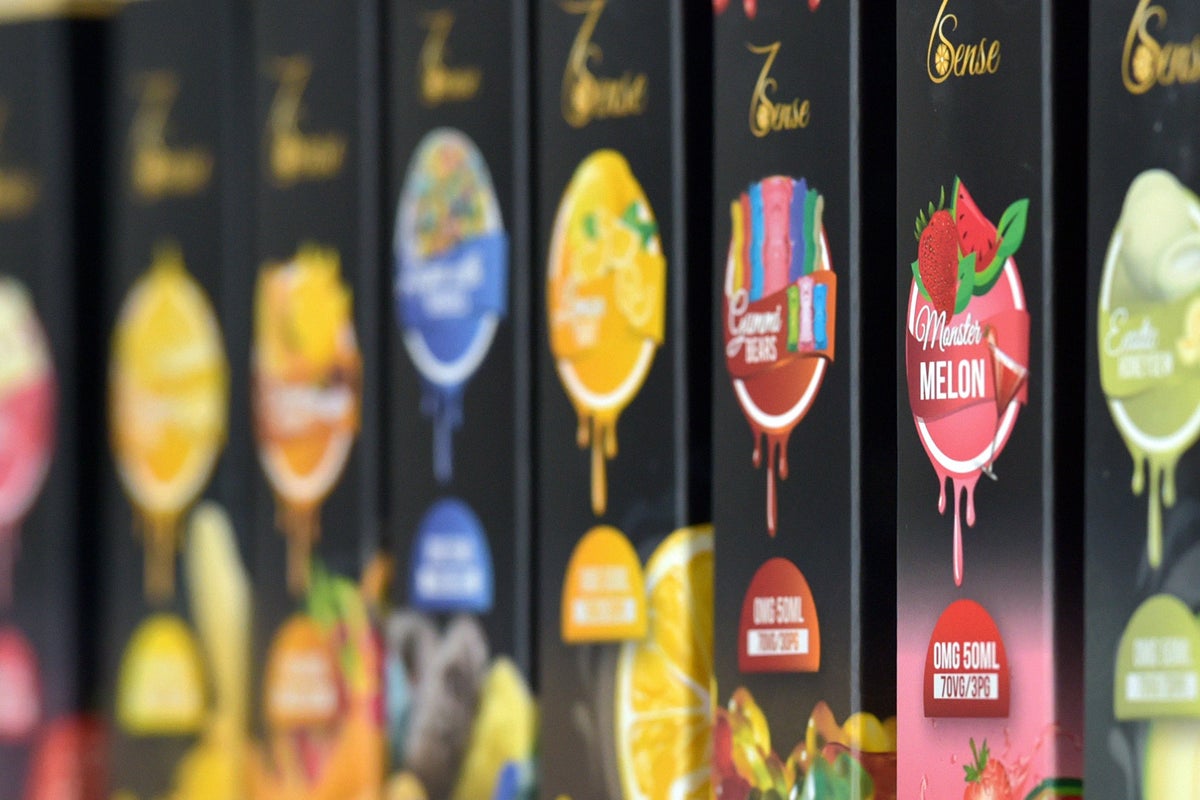
The Health Secretary has pledged to cut the marketing of vapes to children, saying it makes them “look like sweets”.
Steve Barclay said as a father, he is worried about children taking up vaping and being attracted to flavours such as bubblegum and colourful packaging.
Speaking on ITV’s Good Morning Britain to launch a Government consultation on the issue, he said vaping helps smokers quit but “for people that don’t smoke, they shouldn’t vape”.
He added: “What we’re particularly concerned about… is the way that vapes are being marketed to children with bubblegum flavours, making them look like sweets.
“We’ve seen a three-fold increase in the number of children using vapes. Now, one in five children have used vapes and there’s some real concern, particularly when I talk to headteachers and other teachers, in terms of the increasing use of vapes by children.”
He said the Government is “clear that this targeting of children through vapes – making them look like sweets – is wrong”.
Asked about making vapes prescription-only, he added: “We’re looking at international best practice.
“The danger if you make them prescription-only is to what extent does that lower the number of adults moving from smoking to vapes?
“We want to get the balance right, it’s something we’re doing across the UK, there’s actually broad support for taking action on vapes, but the same on disposable vapes, we just want to get the detail right.”
The eight-week consultation seeks views on how vapes can be used by smokers wanting to quit but at the same time lessen their appeal to under-18s.
Among the options being considered are a complete ban on disposable vapes, restricting their sale, or ensuring they cannot be sold in an array of flavours and colours that might appeal to youngsters.
Charities, groups, individuals and industry are invited to give their opinions in the consultation.
The proposals also include introducing plainer packaging and prohibiting the use of cartoons and child-friendly images, regulating whether vapes are on display in shops or behind the counter, and increasing the price.
Vaping can be useful for smokers to quit but should not be marketed to non-smokers and marketing them to children is utterly unacceptable— Professor Sir Chris Whitty
On vape flavours, options include restricting descriptions to make them more generic, so words like “blueberry muffin” cannot appear.
Some experts, including the Royal College of Paediatrics and Child Health (RCPCH) and Children’s Commissioner Dame Rachel de Souza, have called for an outright ban on disposable vapes after data published in May showed a 50% rise in the last year in the proportion of children trying vaping.
Figures show disposable vapes are the e-cigarette of choice among youngsters, with purchases of vapes mostly made from corner shops.
The UK-wide consultation will also examine whether new powers could be brought in for local authorities to issue on-the-spot fines for those selling vapes to people under age.
It is illegal to sell vapes to under-18s but social media carries posts from teenagers showing coloured vapes and discussing flavours such as pink lemonade, strawberry, banana and mango.
Many vapes contain addictive nicotine.
Prime Minister Rishi Sunak, who last week unveiled plans to stop children aged 14 or younger from ever legally being sold cigarettes, said: “Our ambitious plans will reverse the worrying rise in youth vaping while protecting our children from the dangerous long-term effects of smoking as quickly as possible.”
Professor Sir Chris Whitty, Chief Medical Officer for England, said: “Ensuring people do not become addicted to smoking and helping them overcome addiction to stop smoking are two of the best interventions for health.
“Vaping is less dangerous than smoking but still has risks and can cause addiction.
“Vaping can be useful for smokers to quit but should not be marketed to non-smokers and marketing them to children is utterly unacceptable.”
Sarah Woolnough, chief executive at Asthma + Lung UK, said: “It is clear we must urgently act to stop children accessing vapes.
“Disposable vapes at their current pocket-money prices, with cartoons and bubblegum flavour options, are far too attractive and easy for children to access.”
Deborah Arnott, chief executive of health charity Ash, said: “Ground-breaking legislation to protect the next generation from smoking and vaping is needed, wanted and workable.
“This consultation will ensure all voices are heard and the balance is struck between protecting children while still helping adult smokers quit.”
Environment minister Rebecca Pow said: “The scale of the waste created by disposable vapes in the UK is shocking – industry research shows nearly five million single-use vapes are thrown away every week.”
Dr Mike McKean, vice-president for policy at the RCPCH, said he is “pleased to see that Government is heeding our warnings on disposable vapes and is now actively considering a ban, as well as wider restrictions on flavours, packaging, and advertisement.”
David Fothergill, chairman of the Local Government Association’s community wellbeing board, said: “Disposable vapes are an inherently unsustainable product, meaning an outright ban remains the most effective solution to this problem.”
But the Independent British Vape Trade Association, which represents the industry, said its own research shows 56% of regular smokers believe single use vapes help people cut down smoking.
Its chairman Marcus Saxton welcomed the consultation but said there is a risk “policy goes too far and takes away a vital smoking cessation product when simply enforcing existing rules might be just as impactful”.
He added: “As an industry, we recognise that youth vaping needs to be tackled and we stand ready to work with Government towards this, and have previously suggested heavier fines and more regular imposing of those fines for those who flout the rules.”







